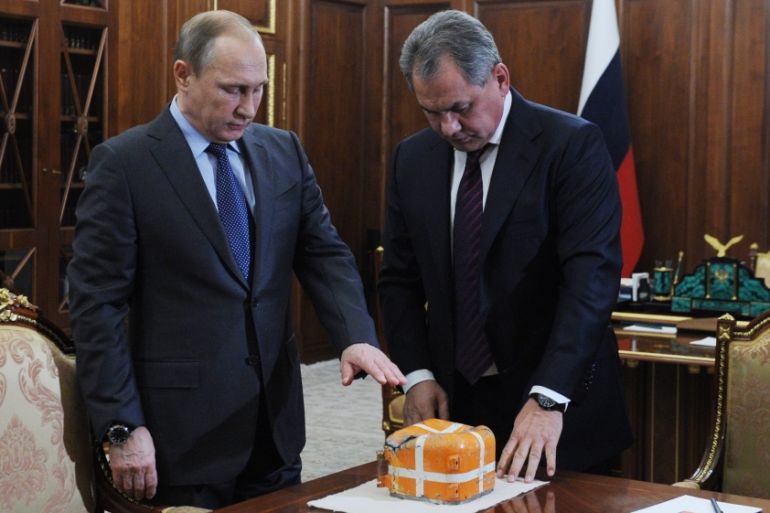Resurgent Russia takes on tenacious Turkey
From Ukraine to Syria, Russia is determined to confront and contain the West.

Russia’s capacity for rapid power projection has been unexpectedly successful, catching many Western observers off guard.
Beyond the Ukrainian theatre, Russian military operations have steadily expanded from assertive sorties violating the airspace of several NATO member countries to a more sophisticated campaign in Syria. And with a missile launch from Russian naval forces in the Caspian Sea, this included a more potent display of force capability.
Yet, it is not the impressive degree of effective power projection that comes as the only surprise. Rather, Russia’s force posture has been equally assertive, marked by an expansion of its presence throughout the wider region.
|
|
| Can Turkey and Russia resolve their dispute? |
Against this backdrop, the downing of a Russian fighter by Turkey near the Syrian border has sparked a critical confrontation between Russia and Turkey.
As this crisis continues to rapidly escalate tension, Russia is moving quickly to bolster its position throughout the wider region.
For Russia, the crisis with Turkey is directly related to a deeper confrontation with the West. And as a key NATO member, Turkey has also contributed to the escalation of tension.
By turning to NATO for support in the immediate aftermath of the shooting down of the Russian warplane, and then by launching its own military operations in northern Iraq, the stage is now set for a more direct confrontation.
OPINION: Turkey-Russia: The inevitable clash of the titans
The Russian response to the Turkish incursion in northern Iraq, which consisted of the deployment of Turkish troops and tanks to Mosul, will probably be twofold. In response, Russian operations will likely target the Turkmen rebels, Turkey’s local allies within northern Syria, in a bid to counter Turkish influence on the ground. Russia may also consider an added move to assist Kurdish forces in their fight against Turkey.
A second likely Russian response will be to broaden the battle space. This would entail diplomatic pressure on Iraq, exploiting Baghdad’s frustration over Turkey’s military incursion in Mosul and enhancing access to Iraqi airspace for Russian forces, and a more ambitious campaign to strengthen its own position and posture in the wider region.
Turkey's own interests are increasingly diverging from Western strategic ambition, especially as it seems more intent on targeting the Kurds than on taking on Islamic State of Iraq and the Levant.
This latter move by Russia is already evident and includes a range of steps, similar to the successful agreement with Cyprus to secure emergency landing rights. Although UK forces are already using their bases in Cyprus for their air operations in Syria, this agreement goes well beyond a similar accord with the French and includes a Cypriot offer of the use of its own facilities for the evacuation of Russian nationals from the larger region.
Another set of recent Russian moves to enhance its position can be seen in the deployment of the modern S-400 air defence systems at the Russian base in Syria, as well as the recent dispatch of the same air defence system to the Arctic.
But Turkey is also seeking to bolster its position, and recently secured an important agreement for a new military base in Qatar, a significant move for the Turkish military, which is not traditionally positioned beyond Turkish territory, with northern Cyprus as the sole exception.
An additional, more tactically significant Russian move was also made with the more conventional deployment of both combat and transport helicopters to reinforce its military base in Armenia.
This move is also directly related to a policy to increase Russian pressure on Turkey, and perhaps to provoke a response from the NATO alliance.
OPINION: Downed Russian jet is just a mirage over Syria
For Russia, which not only maintains a Cold War-legacy base in Armenia, but also guards the closed border between Armenia and Turkey, the aim may be to force NATO to back down, thereby disappointing Turkey’s already high expectations from its Alliance partners.
At the same time, the Russian move to increase its military presence in Armenia may have a direct impact on the region’s already delicate balance of power. That may do little to deter and may actually encourage Azerbaijan to initiate military operations against Armenia, in an escalation of the Nagorno-Karabakh conflict.
Moreover, as Armenia has already been drawn into supporting Russian operations in Syria by proving operational and logistical support, this may only further weaken and limit Western influence and leverage in the broader South Caucasus region.

For the West, the paucity of policy options and the inherent weakness of its position in the region only suggest a further deepening of Russian power and influence.
Equally distressing, as the key strategic frontline state, Turkey’s own interests are increasingly diverging from Western strategic ambition, especially as it seems more intent on targeting the Kurds than on taking on Islamic State of Iraq and the Levant.
And as the rivalry between Turkey and Russia in the region escalates, the South Caucasus will remain an arena of competition and confrontation for some time.
Richard Giragosian is the founding director of the Regional Studies Center, an independent think-tank in Yerevan, Armenia.
The views expressed in this article are the author’s own and do not necessarily reflect Al Jazeera’s editorial policy.
